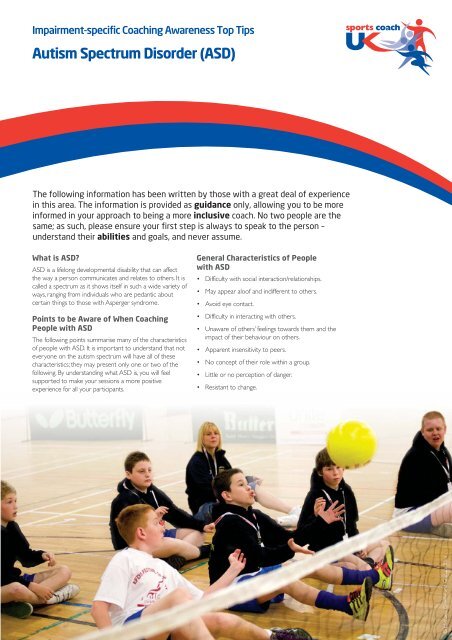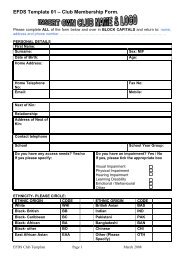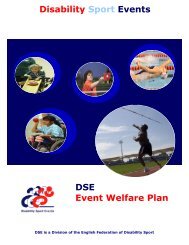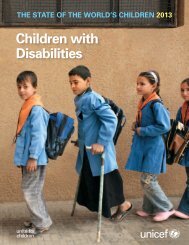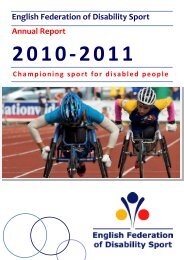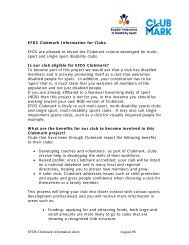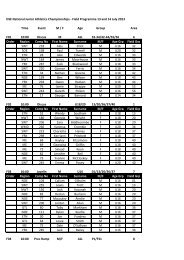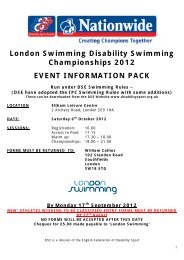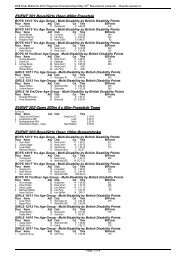Autism factsheet Layout.pdf
Autism factsheet Layout.pdf
Autism factsheet Layout.pdf
- No tags were found...
Create successful ePaper yourself
Turn your PDF publications into a flip-book with our unique Google optimized e-Paper software.
Impairment-specific Coaching Awareness Top Tips<strong>Autism</strong> Spectrum Disorder (ASD)The following information has been written by those with a great deal of experiencein this area. The information is provided as guidance only, allowing you to be moreinformed in your approach to being a more inclusive coach. No two people are thesame; as such, please ensure your first step is always to speak to the person –understand their abilities and goals, and never assume.What is ASD?ASD is a lifelong developmental disability that can affectthe way a person communicates and relates to others. It iscalled a spectrum as it shows itself in such a wide variety ofways, ranging from individuals who are pedantic aboutcertain things to those with Asperger syndrome.Points to be Aware of When CoachingPeople with ASDThe following points summarise many of the characteristicsof people with ASD. It is important to understand that noteveryone on the autism spectrum will have all of thesecharacteristics; they may present only one or two of thefollowing. By understanding what ASD is, you will feelsupported to make your sessions a more positiveexperience for all your participants.General Characteristics of Peoplewith ASD• Difficulty with social interaction/relationships.• May appear aloof and indifferent to others.• Avoid eye contact.• Difficulty in interacting with others.• Unaware of others’ feelings towards them and theimpact of their behaviour on others.• Apparent insensitivity to peers.• No concept of their role within a group.• Little or no perception of danger.• Resistant to change.© Michaela Greene and Graham Bool
Impairment-specific Coaching Awareness Top Tips<strong>Autism</strong> Spectrum Disorder (ASD)Common Characteristics of Peoplewith ASD• Poor physical/motor skills.• Obsessions, usually with toys or objects.• High levels of anxiety.• Lack of motivation.• Depression and low self-esteem.• Inability to transfer skills from one situation to another.• Vulnerable and susceptible to exploitation.• Challenging behaviour.• Self-injury/self-harm.Social Communication• May repeat/echo words or phrases.• Inappropriate laughing or giggling.• No or inappropriate response to sounds.• Difficulty with expression, and so may need touse gestures.• One-sided interaction.• Associate communication/behaviour with people.• Failure to respond to their name (unless lookingat them).• Failure to comply with general instructions when givento a whole group.• Difficulty in understanding verbal communication.• Difficulty in understanding non-verbal communicationsuch as gestures, tone of voice and expressions.Including People with ASD in YourCoaching Sessions• Use their name at the beginning of an instructionor question.• Tell the participant what to do rather than what notto do.• Use face-to-face interaction when possible.• Use visual communication when possible.• Help your participant to anticipate what will happennext (eg ‘When the ball is passed to Bill, who will Billpass to?’).• Give warnings of any changes that are about to happen(eg ‘John, in a few minutes, we will be moving on toa game’).• Control the environment and don’t overstimulate(eg face them away from any distractions).• Teach them the rules and use prompts/reminders toreinforce them.• Provide a definite beginning and end to activities.• Reduce anxiety with a confident and positive approach;the participant will feel safer knowing that if they losecontrol, you won’t.• Provide a safe place and/or person the participant cango to when a situation becomes too much for them tocope with.© sports coach UK, 2012Imagination• Limited imagination; some individuals can beover-imaginative and will ‘know everything’.• Limited development of play (concepts of sharing andtaking turns).• Unusual or inappropriate play.• Inappropriate attachments to objects.• May spin objects or themselves.90783:4For further information and support, visit:www.autism.org.ukEmail: nas@nas.org.ukTel: 020-7833 2299For a two-hour workshop aimed at increasing awareness and confidence of coachingdisabled people in sport, visit www.sportscoachuk.org/coach-disabled-sportAlso, visit www.sportscoachuk.org/inclusion-coaches for further useful information.


